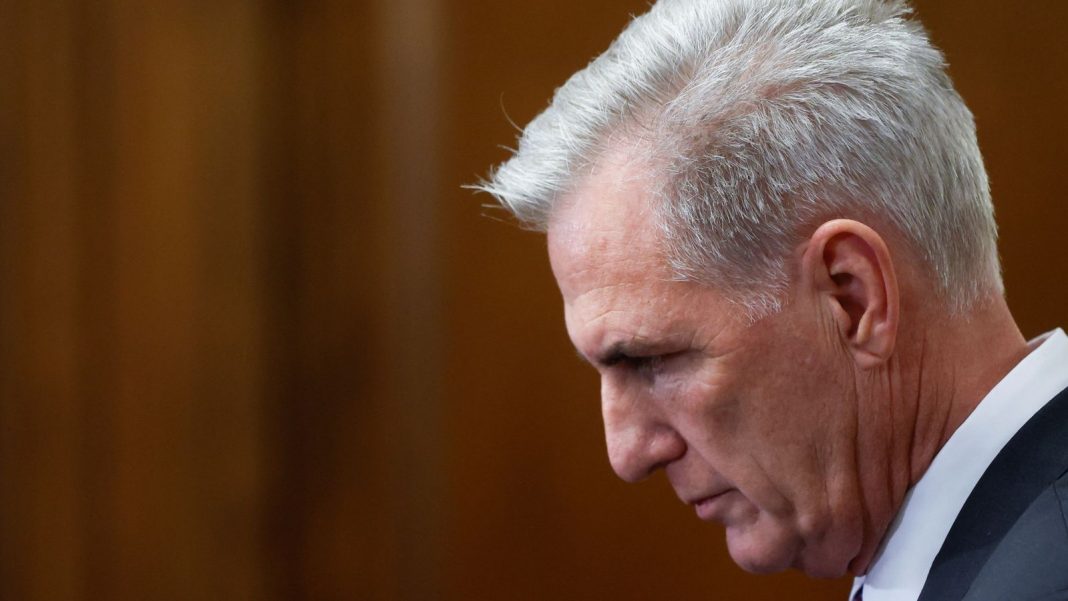The United States government is, once again, on course to shut down.
In just a few hours, when the clock strikes a minute past midnight, the state will likely be unable to pay its bills.
What happens?
It means all non-essential federal services are frozen. Government, military, waster disposal and air traffic control staff are unlikely to be paid. Federal agencies, national parks, federal courts, museums and a plethora of state bodies will be hit.
They simply won’t have the funding to have meet their wage and other bills.
Lawmakers, however, will continue to be paid, thanks to provision in the US constitution.
Why is this happening?
Congress, encompassing the US Senate and House of Representatives, have yet to approve discretionary spending, a necessity for the new US financial year, which starts on 1 October.
Republican House Speaker Kevin McCarthy has not succeeded at getting hard right wing Republicans to agree a deal. If he pushes too hard, or gets a bill passed that the right flank of his party don’t like, he risks losing his job.
Mr McCarthy’s job is predicated on not upsetting that far right cohort. In order to secure his job as speaker he agreed that any House of Representatives member could call for a vote to oust him.
In a way he’s backed himself in to a corner, promising something he couldn’t deliver: to return federal spending to pre-COVID levels. Many Republicans loath the trillions spent on health measures and economic stimulus.
While he secured a deal to lift the debt ceiling with President Joe Biden back in May to avert the US being unable to meet debt repayments, this is a different situation.
There aren’t the same catastrophic economic consequences hanging over a government shutdown and so there’s less of a threat to Mr McCarthy.
Had the US defaulted it would have been first time in the country’s history and would have led to a near total shutdown of the economy. There would have been severe consequences to the worldwide economy.
Please use Chrome browser for a more accessible video player
1:36
House Speaker Kevin McCarthy says he is directing committees to open a formal investigation into a ‘culture of corruption’ around Joe Biden
When has it happened before?
Many times. In the last decade alone there have been four shutdowns over topics such as Obamacare and Trump’s border wall. This one is harder to tie to a specific event.
Most recently, in 2018, Democratic politicians refused to pass a Trump-led spending plan to fund his disputed southern border wall. The shutdown then lasted 35 days.
Numerous government organisations have manuals for furloughing staff in the event of a shutdown.
What are the consequences/effects?
Last time roughly 800,000 workers were furloughed but exact numbers for a 2023 repeat are unclear.
As the first day of the shutdown would be Sunday, the effects will not be immediate as many employees won’t be due at work.
When people activity falter so too does production.
The Congressional Budget Office (CBO) estimated that the five-week Trump shutdown in 2018-2019 reduced economic output by $11bn, including $3bn that the US economy never regained.
Shutdowns also impact America’s reputation as a stable, functioning financial leader, and it had an influence on government spending plans, delaying legislative agendas.
Some consequences are less quantifiable.
The US’s credit rating was already downgraded after just months of debt limit debate that brought the country to the brink of default.
Fitch brought down the rating from AAA – the highest possible – to AA+ over debt and governance concerns.
Lower credit ratings can increase the cost of government borrowing, adding to taxpayer bills, reducing spending and shrinking the economy.
US officials criticised the move, with Treasury Secretary Janet Yellen calling it “arbitrary” and “based on outdated data”.
Another credit agency, Moody’s, said a shutdown would threaten the triple A credit rating it designated for the US.
What are the odds of this happening?
It’s highly likely. Hard-line Republicans in the House of Representatives voted down a long-shot bill proposed by Mr McCarthy to halt the shutdown.
The Senate, which would need to vote to approve any plan, is not scheduled to take a final vote until Sunday despite the final deadline being midnight on Saturday.
How long will it go on for?
No one knows.







